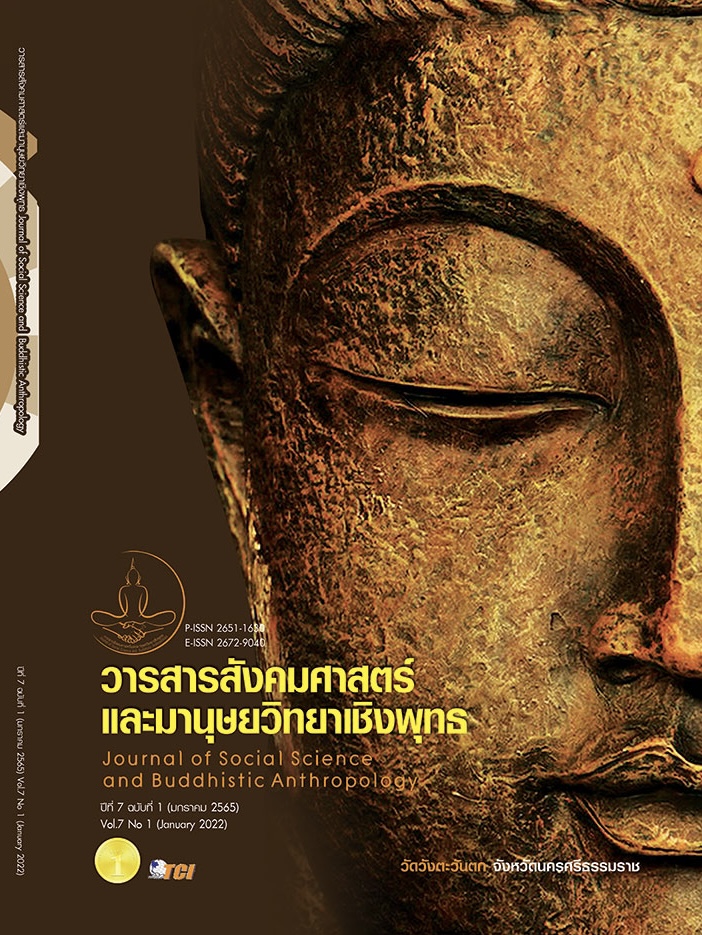DISCIPLINE, SELF - REGULATION AND DEPRESSION OF THE GRADUATE STUDENTSDISCIPLINE, SELF - REGULATION AND DEPRESSION OF THE GRADUATE STUDENTS
Keywords:
Discourse, Discipline, Self-regulation, Depression, Graduate StudentAbstract
The objectives of this research article were to 1) Study the discourse in Thai society at present that affects students' self-discipline and self-regulation. And 2) to study the students’ discipline and self-regulation that resulted in depression among graduate students. This research is qualitative research. The data were collected by in-depth interview and participant observation, analyzed by descriptive interpretation. Key informants were selected by purposive sampling as the subjects in the study who were graduating and suffering from depression, with a total of 15 key informants. The results showed that: 1) Discourses in Thai society at present that affect students' self-discipline and regulation. There are 4 main discourses: 11.) Social capital discourse 1.2) educational discourse 1.3) discourse of good employees' work, and 1.4) family discourse. 2) The process of creating discipline and self-regulation of students that resulted in depression among graduate students. It is a consequence of all discourses on the first point that society expects and monitors students' progress. Students themselves need to be always disciplined and self-regulated by planning to manage time and social relationships for 24 hours a day, what to do in a way that divides the time of activities according to the discourse of work, education, family to avoid mistakes and not to become imperfect or bad. They also monitor their actions and punish themselves when they fail. Those processes have led to the path of people with depression to eventually becoming depressed patients.The objectives of this research article were to 1) Study the discourse in Thai society at present that affects students' self-discipline and self-regulation. And 2) to study the students’ discipline and self-regulation that resulted in depression among graduate students. This research is qualitative research. The data were collected by in-depth interview and participant observation, analyzed by descriptive interpretation. Key informants were selected by purposive sampling as the subjects in the study who were graduating and suffering from depression, with a total of 15 key informants. The results showed that: 1) Discourses in Thai society at present that affect students' self-discipline and regulation. There are 4 main discourses: 11.) Social capital discourse 1.2) educational discourse 1.3) discourse of good employees' work, and 1.4) family discourse. 2) The process of creating discipline and self-regulation of students that resulted in depression among graduate students. It is a consequence of all discourses on the first point that society expects and monitors students' progress. Students themselves need to be always disciplined and self-regulated by planning to manage time and social relationships for 24 hours a day, what to do in a way that divides the time of activities according to the discourse of work, education, family to avoid mistakes and not to become imperfect or bad. They also monitor their actions and punish themselves when they fail. Those processes have led to the path of people with depression to eventually becoming depressed patients.
References
ไชยรัตน์ เจริญสินโอฬาร. (2560). วาทกรรมการพัฒนา: อำนาจ ความรู้ ความจริง เอกลักษณ์ และความเป็นอื่น : Development Discourse: Power Knowledge Truth Identity and thereness. (พิมพ์ครั้งที่ 6). กรุงเทพมหานคร: วิภาษา.
ปิยวรรณ วิเศษสุวรรณภูมิ และคณะ. (2561). เวทีจุฬาฯ เสวนา ครั้งที่ 18 เรื่อง "เข้าใจปัญหาโรคซึมเศร้าในเยาวชน นักศึกษา" ,รู้ลึกกับจุฬา ฉบับวันที่: 18/03/2019. เรียกใช้เมื่อ 20 เมษายน 2562 จาก https://www.chula.ac.th/news-and-knowledge/cu-inside
ผู้ให้ข้อมูลคนสำคัญคนที่ 1. (18 พฤษภาคม 2563). วินัยและการกำกับตนเอง. (จุติพร เปี้ยตั๋น, ผู้สัมภาษณ์)
เพียรอักษร นามโสภา และคณะ. (2562). ความสัมพันธ์ระหว่างภาษาและอุดมการณความเป็นครอบครัวในเฟซบุ๊ก แฟนเพจ Little Monster. ใน รายงานการประชุมวิชาการและนำเสนอผลงานวิจัยระดับชาติและนานาชาติ ครั้งที่ 10. กรุงเทพมหานคร: มหาวิทยาลัยราชภัฏสวนสุนันทา.
ศิริกาญจน์ บวนวิศยศ และคณะ. (2561). การพัฒนารูปแบบการเรียนการสอนเพื่อเสริมสร้างวินัยในตนเองในวิชาชีพครูสำหรับนักศึกษา. วารสารวิจัยและพัฒนาหลักสูตร, 8(1), 242-259.
สำนักบริหารระบบบริการสุขภาพจิต. (2559). การสำรวจระบาดวิทยาสุขภาพจิตของคนไทยระดับชาติ ปี พ.ศ. 2556. กรุงเทพมหานคร: บริษัท บียอนด์พับลิสชิ่ง จำกัด.
สุวรรณา สี่สมประสงค์. (2552). การศึกษาความเครียดของนักศึกษาแพทย์ระดับชั้นปีที่ 4-66. ใน วิทยานิพนธ์การศึกษามหาบัณฑิต สาขาวิชาจิตวิทยาการแนะแนว. มหาวิทยาลัยศรีนครินทรวิโรฒ.
เสริมศักดิ์ กิตติปาลวรรธก์. (2559). วาทกรรมนโยบายประกันคุณภาพการศึกษาระดับอุดมศึกษาของสำนักงานรับรองมาตรฐาน และประกันคุณภาพการศึกษา. วารสารมนุษย์ศาสตร์และสังคมศาสตร์(สทมส), 22(1), 98-106.
อานันท์ กาญจนพันธุ์. (2555). คิดอย่างมิเชล ฟูโกต์ คิดอย่างวิพากษ์ จากวาทกรรมของอัตบุคคล ถึงจุดเปลี่ยนของอัตตา. เชียงใหม่: สำนักพิมพ์มหาวิทยาลัยเชียงใหม่.
Michel, F. (1972). The archaeology of knowledge and the discourse on language. Translation of L’ordre du discours. Translated by A.M. Sheridan Smith. New York: Pantheon
Books.
Teresa, E. (2018). Stress and Relief for American Graduate Students 2011. Retrieved February 2, 2019, from https://www.nature.com/articles/d4158
-018-03803-3
Tyler, C. (2018). Why are so many graduate students depressed? Retrieved January 21, 2019, from https://marginalrevolution.com/marginalre
volution/2018/04/many-graduate-students-depressed.html
UC Berkeley Graduate Assembly. (2015). The Graduate Assembly Graduate Student Happiness & Well-Being Report | 2014. Retrieved January 21, 2019, from https://ga.berkeley.edu/wellbeingreport/
Downloads
Published
How to Cite
Issue
Section
License
Copyright (c) 2022 Journal of Social Science and Buddhistic Anthropology

This work is licensed under a Creative Commons Attribution-NonCommercial-NoDerivatives 4.0 International License.









